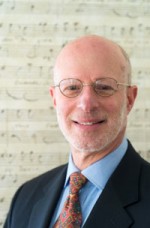The following is posted with the permission of ChamberFest Cleveland and the author.
By Donald Rosenberg

ChamberFest’s 2023 season has a markedly different thrust.
“We wanted this season to be lighter and more upbeat,” says co-director Diana Cohen. “Last year was the fog of Covid. There were a lot of dark pieces.”
The season’s theme began to come into focus after co-director Roman Rabinovich reread Milan Kundera’s The Unbearable Lightness of Being. The 1984 novel’s musings about the human condition and music, Rabinovich sensed, would be a big help in inspiring a compelling selection of works, which they clearly did, without rigidly dictating the season’s content. “We didn’t want it to be a literal translation in musical terms, but to give birth to the imagination,” Rabinovich says. “It gives us a frame. That’s what we’re after — that telescope to look through, a certain lens of ideas, and then we can be free with it.”
Many of this season’s programs are titled (freely) after chapters in Kundera’s novel, in which the protagonists endure the consequences of the Prague Spring of 1968, when protests supporting reform led to the invasion of Czechoslovakia by the Soviet Union. Kundera introduces a character, Tereza, who is “weighed down” by life and another, Sabina, whose “drama was a drama not of heaviness but of lightness. What fell to her lot was not the burden, but the unbearable lightness of being.”
Listeners, of course, don’t attend concerts to seek anything unbearable, so the directors aptly named the ChamberFest season “Lightness of Being.” All of the works listeners will hear, in fact, are pleasurable, on different levels, from the magisterial beauty of four pieces by Mozart — the season’s record-holder in number of contributions — to the cheeky vibrancy of Poulenc’s Sextet for Piano and Winds, the quirky originality of Janáček’s Concertino, and the descriptive delights packed into Saint-Saëns’s Carnival of the Animals.
The season’s repertoire spans five centuries, from incidental music Henry Purcell wrote for The Fairy Queen in 1692 to Michael Stephen Brown’s Vortex for Cello and Strings, which had its premiere just two months ago. Especially notable in a classical field still dominated by deceased white European male composers, the season of music by 26 composers includes five living composers who are women (three others are men). The programs journey across the stylistic map, with works from 11 countries and numerous musical eras.
Some of the composers may not yet be familiar to ChamberFest listeners, but that’s partly the point of their presence. After hearing Carl Frühling’s Clarinet Trio, Sergey Taneyev’s Piano Quintet in G minor, and pieces by living composers Brown, Lera Auerbach, Paquito D’Rivera, Selena Fisher, Helmut Lachenmann, Caroline Shaw, Gabriella Smith, and Judith Weir, audience members might be inclined to try out other pieces by these exceptional creative voices.
Composers we never tire of hearing aren’t neglected, as they never should be. Along with Mozart, the beloved include Schubert (Fantasie in F minor for piano four hands), Brahms (String Sextet No. 1), Dvořák (Piano Quartet No. 2), and Mendelssohn (Piano Sextet in D major). Sibelius, who wrote extensively for chamber ensembles, is also here with an alluring work that has yet to be published: Nights of Jealousy, for the unusual combination of narrator, soprano (in the distance), violin, cello, and piano.
And then there’s Beethoven, whose seminal string quartets alone are reason enough for this composer to be an essential participant in any worthwhile chamber music festival. The one ChamberFest entry this season is the String Quartet No. 16, Beethoven’s last, which happens to have a direct connection to Kundera, who studied musicology and composition before he became a novelist, and The Unbearable Lightness of Being. In eloquent prose about music, fate, Beethoven, and the issue of light vs. heavy, Kundera writes that “we believe that the greatness of man stems from the fact that he bears his fate as Atlas bore the heavens on his shoulders. Beethoven’s hero is a lifter of metaphysical weights.”
For all its proclamations of “Es muss sein!” (“It must be!) and a prayerful slow movement, the String Quartet No. 16 is the lightest of Beethoven’s late string quartets in its embrace of high spirits amid weightier moments. And perhaps Tereza in The Unbearable Lightness of Being speaks for many of us when Kundera notes that “Beethoven became her image of the world on the other side, the world she yearned for.”
We all yearn for a world in which wonders distract us, however briefly, from the mundane and troubling aspects of life. There can be no doubt that ChamberFest continues to provide marvels in this respect. The mix of familiar and unfamiliar, the variety of compositional approaches and instrumentation (even with that Sibelian soprano offstage), and the openness to adventure make the festival a special extravaganza. More evidence on this last point: The program that includes the Sibelius melodrama will find ChamberFest musicians further entering the unknown when clarinetist Ismail Lumanovski and percussionist Jamey Haddad join colleagues for a group improvisation.
All of the bursts of creative and performance imagination the festival is offering this season speak to our abiding desire to bask in the power that music — more than any of the other arts — holds on us. We certainly can identify with Franz, the professor in The Unbearable Lightness of Being, for whom “music was the art that comes closest to Dionysian beauty in the sense of intoxication,” writes Kundera. “He considered music a liberating force: it liberated him from loneliness, introversion, the dust of the library; it opened the door of his body and allowed his soul to step out into the world to make friends.”
Here’s to intoxication, liberation, and friendship, ChamberFest-style.
Published on ClevelandClassical.com June 7, 2023.
Click here for a printable copy of this article


